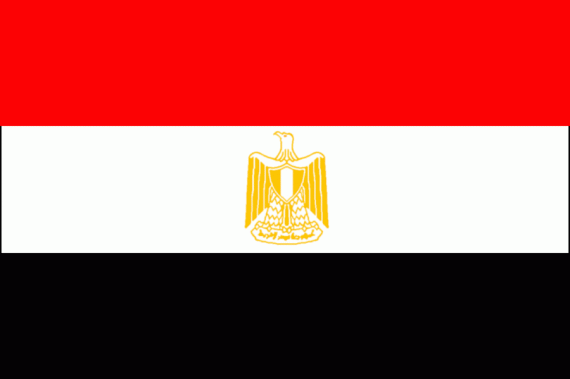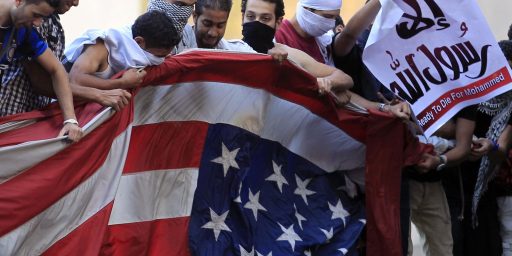Escalation in Egypt
The situatution in Egypt continues to escalate as the state strikes back at the prostests.
 The Egyptian government is clearly concerned about the situation that has erupted in the streets.
The Egyptian government is clearly concerned about the situation that has erupted in the streets.
Not only have curfews been ordered, but it would appear that the country’s leaders have moved to cut off as much internet access for its population as possible.
Via renesys Blog: Egypt Leaves the Internet
every Egyptian provider, every business, bank, Internet cafe, website, school, embassy, and government office that relied on the big four Egyptian ISPs for their Internet connectivity is now cut off from the rest of the world. Link Egypt, Vodafone/Raya, Telecom Egypt, Etisalat Misr, and all their customers and partners are, for the moment, off the air.
And a vital set of questions is asked:
What happens when you disconnect a modern economy and 80,000,000 people from the Internet? What will happen tomorrow, on the streets and in the credit markets? This has never happened before, and the unknowns are piling up.
Since Fridays and Saturdays are not works days in Egypt, perhaps the government is gambling that they can get the situation in order in a few days, but this is increasingly looking unlikely and there will be financial ramifications on Egyptian business if they remain cut off from the world. Indeed, this move is meant to blind and mute the protestors in terms of communicating with themselves and organizing their activities, but it a move that could also deepen the crisis and turn more Egyptians against the Mubarak regime.
Escalation on behalf of the state continues, as CNN is reporting that the military is being deployed against the protestors: Egypt sends army into streets amid mass protests:
The Egyptian army patrolled the streets of Cairo with armored personnel carriers Friday after thousands of angry anti-government demonstrators clashed with tear-gas firing police.
If the military maintains alliance to the government, then this will be no Tunisia.
Mubarak is supposedly set to address the public for the first time since unrest began.
Meanwhile, CNN and others are reporting that Mohamed ElBaradei has been placed under house arrest.





![Military Coup Underway In Egypt [Update: Morsi Deposed]](https://otb.cachefly.net/wp-content/uploads/2011/02/egypt-flag3-512x256.gif)
So, are these North African insurrections related or unrelated to European financial crises?
My gut is that a time of change has come, and that the world is a little less locked in to any particular future.
Might this spread to Iran?
The closure or the internet, the cutting off of cell phones, and the harassment of foreign media cameramen is all meant for one purpose only: the Egyptian government does not want the world to see what is about to happen. Now that the army has moved in, it won’t be long before a brutal repression will happen.
@JP: I have my doubts about a wave of change. The structure of the governments in Tunisia and Egypt are/were sufficiently different that I do not see a similar outcome here, but we shall see.
@anjin-san: if there is a wave right it seems to me that it is aimed at old-style autocracies, which Iran is not (and, indeed, we have already seen that Iranian street protests, even with the backing of major political figures) failed.
@Patrick: I fear that you are correct. It both makes coordination of the protest difficult and limits what the outside can see (although it will be impossible to utterly black out the situation, one would think).
I don’t think keeping foreigners from seeing what’s going on is the sole reason for the blockage. Many Egyptians use social media; social media has certainly played a role in organizing dissent in other countries.
The irony is that there are powerful groups in Egypt who grew without using social media or the Internet. Those groups include the Muslim Brotherhood, Islamic Jihad, and others inimical to US interests. They aren’t encumbered by the shutdown, not in the least.
Brutal repression is certainly possible, but only so long as the military and paramilitaries don’t start agreeing with the protesters. As they are pretty much in the same economic boat as the general population, they could switch sides abruptly.
I’m not seeing any reporting coming out of Upper (i.e., southern) Egypt. The MB plays a strong role there, though of course the bulk of Egypt’s population is in Lower Egypt, including the Nile Delta cities.
I keep hearing all this gushing coverage about how the people protesting aren’t Muslim Brotherhood and this is all secular etc. But does anyone seriously believe that the Brotherhood isn’t just waiting to see where the wind is blowing? And further, does anyone seriously believe that the Brotherhood will not be the strongest bloc in a post-Mubarak Egypt?
I’m not necessarily saying that this means that we should view the status quo ante as the ideal situation. I just find some of the coverage pretty naive in the unguarded assumption that this is somehow going to be a victory for the secular democratic Left (such as it is). I don’t believe for a minute that the people currently in the streets have the numbers, ideological coherence, organisational heft or strategic smarts to hold back the Brotherhood if the regime ultimately goes under.
Tony,
To be blunt, if the people of Egypt want to elect the Muslim Brotherhood to power that’s their right.
To visualize the Egyptian internet blockade, check out this graph:
http://andrewsullivan.theatlantic.com/the_daily_dish/2011/01/chart-of-the-day-12.html
“….if the people of Egypt want to elect the Muslim Brotherhood to power that’s their right.”
I’m not saying it isn’t (though I suspect that, once elected, the people of Egypt may find them very hard to un-elect). As I say, I’m not offering a policy prescription. I just think that some people are being a bit over-optimistic.
What a good idea BW. Jihadists in charge of another country. This one with the ability to block the Suez Canal. Is there some part of World War III you find attactive?
What do you plan to do about it RagingShaft? You going to suit up and lead the invasion, or sit back and wave a flag while other people take bullets? It isn’t our f***king canal. The U.S. doesn’t actually own the entire planet, and seeing as our military has failed to achieve any of its strategic objectives during a decade of war, how do you propose we put a stop to 80 million people demanding a change in their government?
Lay out your plan. I’d REALLY like to know.
> (though I suspect that, once elected, the people of Egypt may find them very hard to un-elect).
And that would be different than Mubarak how exactly?
> Lay out your plan. I’d REALLY like to know
Buddy, if you were are real American, you would know that talking tough on a blog is the answer to all our problems…
“You going to suit up and lead the invasion, or sit back and wave a flag while other people take bullets?”
Seeing as how he chose the second option for all the military conflicts we’ve been involved in during this century, there’s no reason to think he won’t continue along that path…